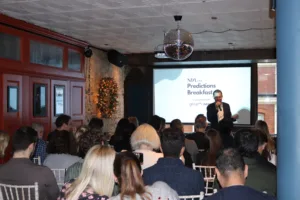International Day of the Girl celebrates their right to education and highlights the need to eliminate all forms of discrimination against girls. Whilst the UK is much further ahead than other countries when it comes to equality, prejudice is visible and there is still so far to go. A huge gender gap remains prominent in industries such as technology, engineering and science, evident right back to the classroom. The girls who do push through these barriers face discrimination as they fight to enter the male-dominated workplace – women account for just 31% of the UK tech workforce and hold only 5% of the leadership roles within the sector.
With this in mind, New Digital Age has spoken to eleven technology industry experts to discuss the gender gap within the industry and identify steps that can be taken to encourage more girls to study STEM.
Encouragement within education
It is no surprise that the STEM gender gap is so prominent when it is evident from the very beginning of a girl’s career – the classroom. Encouraging girls to pursue STEM subjects at school is the starting point of closing the gender gap.
“Gender equality begins with education. This leads to more women in STEM that are well equipped to go into tech and leadership roles,” tells Julie Giannini, Chief Customer Officer at Egnyte. “When girls are educated and have the support of their family and friends, our countries, communities and companies become stronger and better able to flourish.”
“It’s no coincidence that while most girls show some interest in STEM subjects at 10 or 11 years of age, this tends to wane by age 15. Schools must continue to find new ways to keep girls engaged in STEM subjects, by providing the opportunity to build websites, learn to code or use robotic toys,” explains Agata Nowakowska, Area Vice President EMEA at Skillsoft.
Sara Hamilton, Deputy Director of Product & Managed Services at Mango Solutions agrees that “encouraging younger girls to choose STEM subjects is the first step on the road to getting more women in the technology industry. The good news is that this year saw a 5.79% rise in female A-level participants for STEM-focused programmes, including a 13.02% increase in computing. This is really encouraging but there’s still a long way to go to closing the STEM skills gap. Helping schools to broaden their curriculum is another positive way to get school children thinking about a career in technology.”
“2021 saw female mathematics students overtake their male counterparts for the very first time in the number of top grades achieved at A-level,” adds Fiona Hood, Pre Sales Director at Totalmobile. “Evidence like this shows us how effective it can be to encourage STEM from a young age. However, an early look at the effects of the pandemic has revealed 66% of girls claim they are learning less now through online courses, meaning that focusing our attention on supporting girls in education has never been more important than it is now.”
We need more girls in here!
Within the tech industry, 72% of women report being regularly outnumbered by men in business meetings by at least a 2:1 ratio. Twenty-six percent of women put this ratio as 5:1 or more. Not only are women outnumbered in these industries, but they are also underappreciated, often earning only a percentage of their male co-workers’ salaries.
“The Gender Pay Gap reporting exercise in the UK has provided a snapshot into the economic inequality that still exists, both globally and locally. Occupational segregation in the tech sector, and in senior leadership roles, continues to contribute to the ongoing pay divide. In fact, this year’s findings show that a staggering amount of national employers and high street names still have large pay gaps, with 7,572 out of the 9,628 companies that filled, reporting a pay gap which favours men,” notes Samantha Thorne, Head of People at Node4.
“Women have faced inequality for years and the gender gap, especially in technology companies, is still present today even as great strides have been made over the past few decades. We cannot leave the gender gap issue to others: it is up to women to empower, encourage and build up other women in the industry,” emphasises Nicola Kinsella, VP of Global Marketing at Fluent Commerce.
“One of the many hurdles women face is seeing themselves as someone who can have a career in technology,” furthers Brooke Candelore, Product Manager for BrightGauge, a ConnectWise solution. “Working in a male-dominated field has been challenging, and I often feel like a fish out of water. One of the things that has made the biggest difference for me is having an outward mindset towards my colleagues. No matter a person’s sex, we all are striving to be the best versions of ourselves that we can be, and if we work together to build each other up then we can achieve great things.”
Diane Albano, Chief Revenue Officer at Globalization Partners champions initiatives like International Day of the Girl and events such as PANGEO for “evaluating the development barriers many women still face throughout their careers and looking forwards to how we can create a fairer future of work.
“Women should be encouraged to choose a career path that suits their skill set, interests, and passions. In many cases, this can mean pursuing roles that are still male-dominated, but breaking traditional barriers needs female trailblazers to follow their ambitions with an assertive, confident, and vocal attitude.”
Taking the path less travelled
It is clear that the gender gap within these male-dominated industries needs closing, but how do we achieve that?
“Creating a more female-friendly tech industry will require fundamental changes at the level of companies and employers, but also within the education system and the underlying assumptions that are still prevalent in society today,” notes Ann Lloyd, VP Customer Success & Experience at Axway.
“Increased mentorship is one way forward for diversity,” explains Debra Danielson, CTO and SVP Engineering at Digital Guardian. “As a woman working in technology, I can say that, outside of my own dogged stubbornness, my opportunities have stemmed from having a single person willing to advocate for me. That helped me break through some of the lazy stereotypes about women in STEM… being perceived to be less technical, less mathematical than men. Our allies, supporters and advocates can help open the door, and we need vocal colleagues and managers willing to give women chances and support us on our journeys.”
Samantha Humphries, Head of Security Strategy EMEA at Exabeam agrees that “when women and girls see themselves represented, they are far more likely to relate, interact and aspire towards the same goal. This is why the power of mentorship is so important. There are countless benefits of learning from people who have walked in your shoes.”
She concludes: “However, we cannot walk alone. It is not just women who should support one another, but male allies too. I urge everyone to stand up and be counted, to challenge gender equality as it is, and work for the parity that there must be.”









